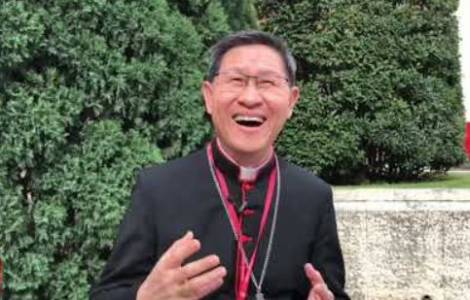PMS Continues Mission During Pandemic
Comments by Cardinal Luis Antonio Tagle, Prefect of the Congregation for the Evangelization of Peoples

“During the painful time of the pandemic, our mission to be close to those who suffer has never lacked. The Pontifical Mission Societies continued to share experiences, they managed to understand the suffering of many peoples through continuous exchanges, also online. Even though we have suffered a lot as a human family, the pandemic has not prevented us from carrying out our missionary activity”, said Cardinal Luis Antonio Tagle, Prefect of the Congregation for the Evangelization of Peoples, speaking at the opening of the annual Assembly of the Pontifical Mission Societies (PMS), which takes place in digital form from June 1 to 3, 2021.
“Missionary action stems from a deep spirituality, as Pope Francis reminded us: we must not forget the primacy of the Lord’s grace”, he reiterated, noting that the pandemic has provided “a great lesson in humility” because many pastoral plans and programs could not be carried out and there was “a re-education to rely on Providence and the grace of the Lord”. “We were taught that prayer is essential for animation and missionary activity, as we see in Pauline Jaricot: missionary animation is not separate from being disciples, friends of Jesus, who sends us to bear fruit”, reiterated the Cardinal.
In this context, the Cardinal reiterated that the PMS is not only “a fundraising body”, but has the task of “awakening the missionary spirit that is at the heart of baptism, therefore specific to each baptized”. Noting that often the missionary commitment is relegated to a group of people or only on World Missions Day, with the relative collection, the Cardinal noted that with the pandemic, “we have returned to the heart of the mission, by awakening missionary participation in families, homes, schools, parishes, workplaces”. By rediscovering this missionary vocation of each baptized person, “this translates into acts of missionary charity and solidarity towards the poor and the suffering: the fundraising is fueled by this missionary charity”, explained Cardinal Tagle.
In the work of sharing the Good News, the Cardinal dwelled on the communication that takes place today in the digital world, inviting people to use the tools of the web and social media to share stories and experiences of young people and lay missionaries who “are examples of great inspiration for society”. During this time of pandemic, he pointed out, there has even been a general increase in requests for biblical and spiritual materials and content in order to share them in the digital world and that is why the Pontifical Mission Societies should also use these tools more for evangelization work.
And, referring to the French philosopher and writer Fabrice Hadjadj, he encouraged the participants gathered online to reflect on the following question: “How do we talk about God, how do we pass on the Good News?” It is not just a matter of technique, performance or strategy, to captivate the audience, he said, because if evangelization is reduced to that alone, it becomes propaganda, distorted communication, flawed or just rhetoric. Missionary communication is rather based on the dimension of the “Missio Dei”, “from God who communicates with his people, in a love relationship”. “God spoke by sending us the Son, the Word who became flesh” and in this way “he adopted the language of mankind”, he said, inviting the participants to rediscover this dimension.
The Cardinal wished that before communicating, “we should return” to the experiences which deprive us of our words”, such as those “of the horror we feel in the face of evil or in the face of an incredible good, which goes beyond our human capacity”. “The sense of total inability to react, the amazement – he said – will allow us to communicate through prayer. The amazement in the face of good prepares our communication and when we open our mouths it is a true song of joy, of hope, which the world needs”, especially the young people who today seek authenticity and credibility in communicators.
“In communicating the Gospel, we must ask ourselves whether we are actually living the good news of the gospel and putting it into practice rather than just preaching it, because young people, experts in virtual reality, notice whether the person who communicates is authentic if it lives this message it communicates”, concluded Cardinal Tagle, inviting everyone to continue to “communicate and infect people with the beauty of the Good News”.
Related

A Call for Peace in 16 Languages in Krakow and Across Six Continents
Heschel Centre for Catholic-Jewish Relations at the Catholic University of Lublin
11 March, 2025
2 min

The Spirit led him through the desert, while he was tempted: Fr. Jorge Miró
Jorge Miró
09 March, 2025
3 min

Reflection by Monsignor Enrique Díaz: Temptations
Enrique Díaz
08 March, 2025
6 min

The Church in Mexico calls to promote the culture of life in the Jubilee of Hope 2025
Exaudi Staff
06 March, 2025
1 min
 (EN)
(EN)
 (ES)
(ES)
 (IT)
(IT)

